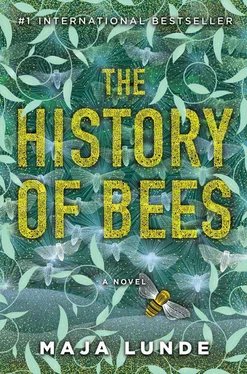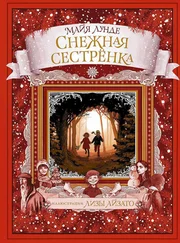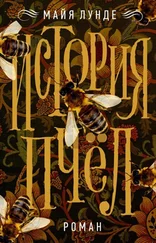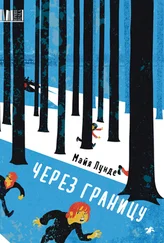Maja Lunde
THE HISTORY OF BEES
To Linus, Jens and Jesper
District 242, Shirong, Sichuan, 2098
Like oversize birds, we balanced on our respective branches, each of us with a plastic container in one hand and a feather brush in the other.
I climbed upwards, very slowly, as carefully as I could. I was not cut out for this, wasn’t like many of the other women on the crew, my movements were often too heavy-handed. I lacked the subtle motor skills and precision required. This wasn’t what I was made for, but all the same I had to be here, every single day, twelve hours a day.
The trees were as old as a lifetime. The branches were as fragile as thin glass, they cracked beneath our weight. I twisted myself carefully, mustn’t damage the tree. I placed my right foot on a branch even further up, and carefully pulled the left up behind it. And finally I found a secure working position, uncomfortable but stable. From here I could reach the uppermost flowers.
The little plastic container was full of the gossamer gold, carefully weighed out. I tried to transfer invisible portions lightly out of the container and over into the trees. Each individual blossom was to be dusted with the tiny brush of hen feathers, from hens scientifically cultivated for precisely this purpose. No feathers of artificial fibers had proven nearly as effective. It had been tested, and then tested again, because we had had plenty of time—in my district the tradition of hand pollination was more than a hundred years old. The bees here had disappeared back in the 1980s, long before The Collapse; pesticides had done away with them. A few years later, when the pesticides were no longer in use, the bees returned, but by then hand pollination had already been implemented. The results were better, even though an incredible number of people, an incredible number of hands were required. And so, when The Collapse came, my district had a competitive edge. It had paid off to be the ones who polluted the most. We were a pioneer nation in pollution and so we became a pioneer nation in pollination. A paradox had saved us.
I stretched as far as I could, but couldn’t quite reach the blossom at the very top. I was about to give up, but knew I might be punished, so I tried once more. Our pay was docked if we used up the pollen too quickly. And our pay was docked if we used too little. The work was invisible. When at the end of the day we climbed down from the trees, there was no evidence of our work except for the red chalk X ’s on the tree trunks, ideally up to forty trees each day. It wasn’t until autumn came and the trees were laden with fruit that we would know who among us had actually succeeded in their work. And by then we had usually forgotten which trees had been dusted by whom.
I was assigned to Field 748 today. Out of how many? I didn’t know. My group was one of hundreds. In our beige work uniforms we were just as anonymous as the trees. And just as close together as the flowers. Never alone, always together in a flock, up here in the trees, or wandering down the tire ruts from one field to the next. Only behind the walls of our own small flats could we be alone, a few short hours a day. Our whole lives were out here.
It was quiet. We weren’t allowed to speak while we worked. The only sound to be heard was that of our careful movements in the trees, a faint clearing of the throat, some yawns and the material of our uniforms against the tree trunks. And sometimes the sound we had all learned to dislike—a branch creaking and in the worst case breaking. A broken branch meant less fruit, and yet another reason to dock our pay.
Otherwise only the wind was audible, passing through branches, brushing across the blossoms, slipping through the grass on the ground.
A fly buzzed through the air, a rare sight. It had been several days since I had seen a bird, there were fewer of them as well. They hunted the few insects to be found, and starved, like the rest of the world.
But then an earsplitting sound broke the silence. It was the whistle from the management’s barracks, the signal for the second and final break of the day. I noticed immediately how parched my tongue was.
I climbed down with awkward caution. My workmates and I crept down from the trees to the ground. The other women had already begun chatting, as if their cacophonic prattle was flipped on like a switch the split second they knew that they could.
I said nothing, concentrating on getting down without breaking a branch. I managed it. Pure luck. I was infinitely clumsy, had been working out here long enough to know that I would never be really good at the job.
On the ground beside the tree was a beat-up metal water bottle. I grabbed it and drank quickly. The water was lukewarm and tasted of aluminum, the taste made me drink less than I needed.
Two young boys dressed in white from the Trade Commission rapidly distributed the reusable tin boxes containing the second meal of the day. I sat down by myself with my back against the tree trunk and opened mine. The rice was mixed with corn today. I ate quickly. As usual, a bit too salty, and seasoned with artificially manufactured chili pepper and soy. It had been a long time since I had tasted meat. Animal feed required too much arable land. And a lot of the traditional animal feed required pollination. The animals weren’t worth our painstaking handiwork.
The tin box was empty before I was full. I stood up and put it back in the return basket from the Trade Commission. Then I jogged in place. My legs were tired, but nonetheless stiff from standing still in locked positions up there in the trees. My blood tingled; I couldn’t stand still.
But it didn’t help. I took a quick look around me. Nobody from management was paying attention. I quickly lay down on the ground, just to stretch out my back. It was aching after having been bent over in the same position for a long time.
I closed my eyes for a moment, tried to shut out the conversation of the other women of the crew, instead listening to how the chatter rose and fell in volume. This need to talk, all of them at the same time, where did it come from? The other women had started when they were little girls. Hour after hour of group conversations where the subject was always of the lowest common denominator and one could never really go into depth about anything. Perhaps with the exception of when the one being talked about wasn’t there.
Personally I preferred one-on-one conversations. Or my own company, for that matter. At work, often the latter. At home I had Kuan, my husband. Not that we had the longest conversations, either, conversation wasn’t what held us together. Kuan’s references were here and now, he was concrete, didn’t crave knowledge, something more. But in his arms I found peace. And then we had Wei-Wen, our three-year-old. Him we could talk about.
Just as the cacophony had almost sung me to sleep, it suddenly fell silent. Everyone was quiet.
I sat up. The others on the crew were facing the road.
The entourage was walking down the tire ruts and towards us.
They were no more than eight or nine years old. I recognized several of them from Wei-Wen’s school. All of them had been given identical work clothes, the same synthetic beige uniforms that we were wearing, and they walked towards us as quickly as their short legs could carry them. Two adult leaders kept them in line. One in front, one behind. Both of them were equipped with powerful voices that corrected the children without cease, but they did not reprimand them, giving instructions with warmth and compassion, because even though the children had not yet fully taken in where they were headed, the adults knew.
Читать дальше










